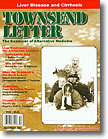


From the
Townsend Letter |
||
Chlorella May Help Reduce Harmful Toxins in
Breast Milk |
||
A landmark study published in the Journal
of Medicinal Food suggests
that chlorella may indeed help reduce harmful toxins, known as dioxins,
in breast milk. The study, conducted by Japanese researchers, investigated
35 healthy pregnant females and found that of the participants who
supplemented their diets with chlorella, there was a significant decrease
in the amount of dioxin measured in the participants' breast milk.
Additionally, the study found that this same group had an increase
in a property found in blood, known as immunoglobulins, believed to
be responsible for reducing the risk of infection in nursing infants.
Campbell J. What is dioxin? Available at: http://www.cqs.com/edioxin.htm.
Accessed
|
||
![]()
Consult your doctor before using any of the treatments found within this site.
![]()
Subscriptions are available for Townsend Letter, the Examiner of Alternative Medicine magazine, which is published 10 times each year.
Search our pre-2001
archives for further information. Older issues of the printed magazine
are also indexed for your convenience.
1983-2001
indices ; recent indices
Once you find the magazines you'd like to order, please use our convenient form, e-mail subscriptions@townsendletter.com, or call 360.385.6021 (PST).
Who are we? | New
articles | Featured topics |
Tables of contents | Subscriptions | Contact
us | Links | Classifieds | Advertise | Alternative
Medicine Conference Calendar | Search site | Archives |
EDTA
Chelation Therapy | Home
© 1983-2007 Townsend Letter for Doctors & Patients
All rights reserved.
Website by Sandy Hershelman
Designs
December 20, 2007
![]()

